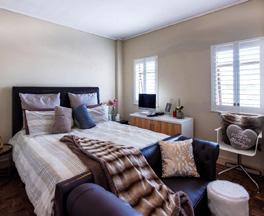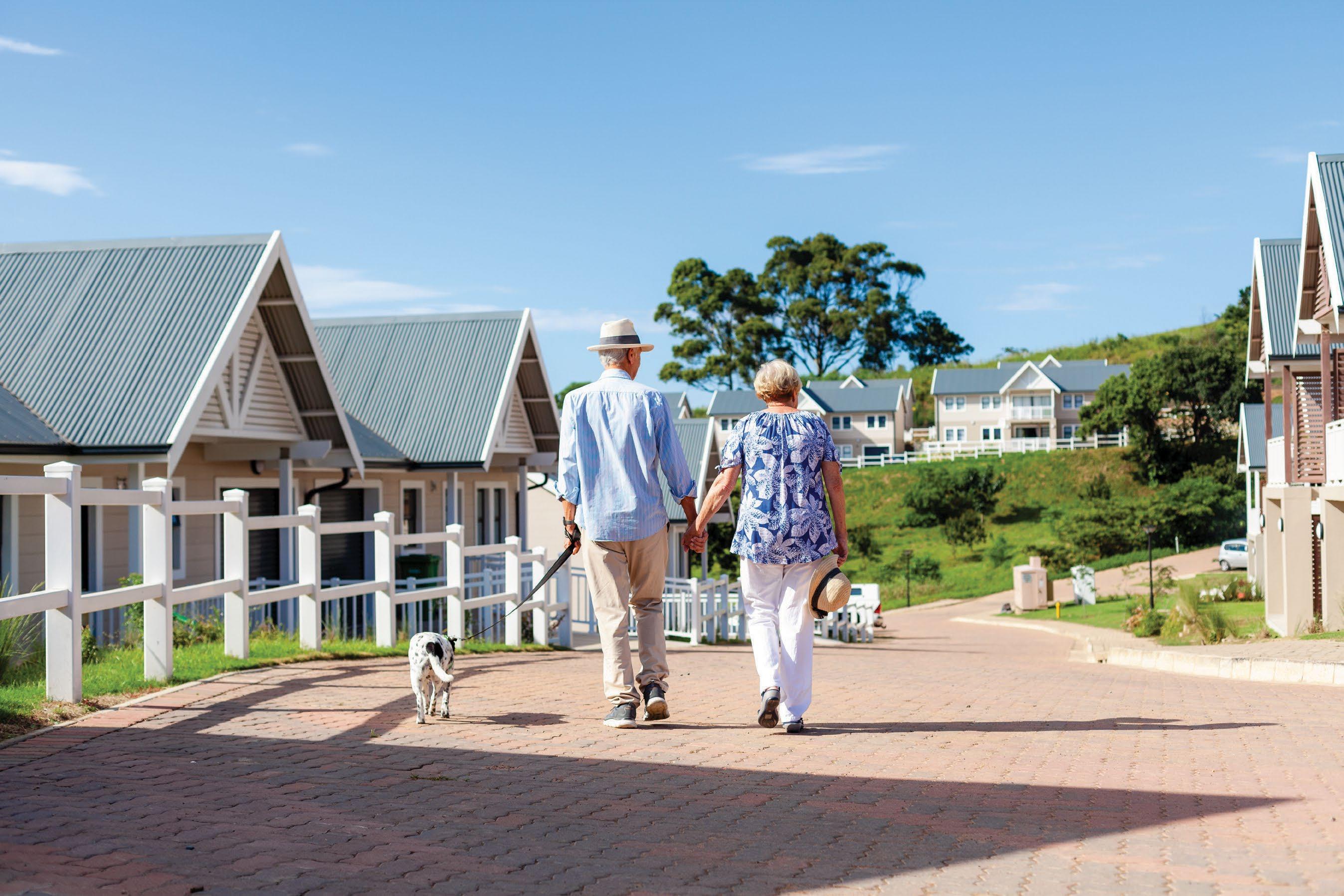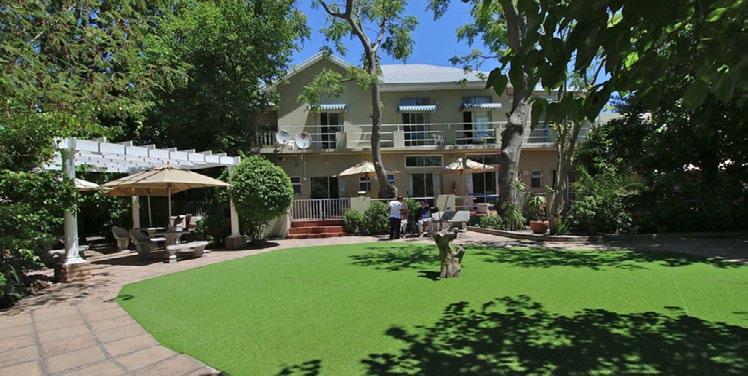360 PROPERTY YOU CAN OWN YOUR OWN HOME page 3





SOME banks are offering 100% bonds to qualifying buyers but, with their risk going up alongside rising levels of financial stress, it helps to have a deposit.
Furthermore, having the down payment will decrease your monthly bond repayments.

If you do dream about buying your own home, you might want to take some extra time to save for a deposit, says Paul Stevens, the chief executive of Just Property.
“Deferring the dream for a year or two in order to save towards a larger deposit will decrease the amount you have to borrow and the amount you pay in the long term.”
Explaining the financial intricacies of a deposit, he says it is usually 10% of the purchase price. Prospective firsttime homebuyers aiming to acquire a property valued at R1 million, without a 100% bond, would typically require a R100 000 deposit.
Putting down the amount as a deposit would take your monthly repayment to R8 670, as opposed to R10 837 without it.
“It can be done, and just imagine, over 20 years, how much you’d be saving.”
But how does one save R100 000 in two years? Well, Stevens says, you’d be “astonished” at how quickly the savings from temporary adjustments to lifestyle and spending habits can mount.
“And what is two years of tightening your belt if it helps you enter the property market and significantly decreases your long-term bond repayments?”
To add R100 000 to your deposit, you’d be aiming to save R50 000 a year over the next two years. That would require a monthly saving of approximately R4 200.
He offers 10 changes to help you start saving for a larger deposit:
1. Investigate and cut expenses Items like cosmetics, cleaning supplies and grocery basics are good options. Compare prices on the shelves and opt for the cheapest alternative. Research potential savings at various wholesalers and try to find out what each supermarket has identified as its products that are sold at a loss to attract customers.
You may want to buy meat and dairy from one shop, name-brand cleaning products from another and fruit from yet another.
2. Shopping self-control When shopping, purchase only necessities and focus on special offers. Better still, use online shopping so you’re not tempted in the aisles. You can identify a few luxuries to indulge in now and then.
3. Save at the beginning of the month Put that R4 200 away at the beginning of each month rather than attempting to save what remains after expenses. Bank your savings in a 72-day call account that offers a higher interest rate as well as accessibility while discouraging impulsive withdrawals.
4. Cook at home Aim for homemade dishes instead of ready-to-cook or takeaway meals. This can lead to significant savings. Cook in bulk one day a week, eat one portion that night and refrigerate the remainder. That way, you will also cut down on electricity.
5. Relook at your vehicle usage Evaluate the need for two vehicles if you’re part of a couple. Consider selling one vehicle and opting for a scooter or downsizing to a single vehicle, especially if one or both of you work from home. Although this may seem a significant sacrifice, the reward of owning a home in just two years will make it worthwhile.
6. Update insurance policies Is your insurance policy, regarding the value of assets such as vehicles and computers, current? Find out if your premiums can be lowered.
7. Reconsider phone upgrades Sticking to your current phone model and downgrading to the cheapest contract can save hundreds of rand a month. Could you join a cheaper gym or cancel your membership and take up running for the next two years instead?
8. Earn extra income Could you start a side hustle, tutor over the weekends or wait tables one or two nights a week? Think about what else you could do (or sell) to bring in extra money. Pay it straight into the savings account.
9. Downsize If you rent, consider temporarily downsizing to a smaller rental unit. This will reduce rental expenses while you save for your deposit. Keep in mind that the arrangement is temporary, and the goal is to move into your own home.
10. Be frugal If you receive a bonus, monetary gift or commission, keep 5% to spoil yourself and pay the rest into your savings account. Using a portion to take advantage of special bulk-buy deals is also a good option.
Francois du Toit, the director at Tyson Properties Johannesburg, advises young aspiring homeowners to start saving early for their bond deposit and transfer fees. They should also start settling any debt they have, big or small.
“Start with the smallest and work your way through; every time you settle a small amount outstanding, move to the next one and increase the payment. A good, clean credit record in today’s day and age becomes crucial for any first-time buyer.”
Echoing this, Richard Gray, the chief executive of Harcourts SA, says a good credit history is crucial for securing favourable home loan lending terms.
“Establish good credit habits by paying your bills on time, keeping credit card balances low and avoiding excessive debt.”
When saving for a deposit, you should create a budget and set aside a portion of your income specifically for saving.
“Explore down payment assistance programmes, consider alternative funding sources, and be disciplined in your savings efforts.”
You should try getting a feel for your home loan affordability at least one year before you plan to buy, says David Jacobs, the regional sales manager for the Rawson Property Group.
“Before you start investigating the property market, get a ballpark estimate of what you might be able to afford. That way, you can narrow your research to properties within your price range. The quickest way to get a budget estimate is to use an online affordability calculator, but visiting a bond originator will give you a more accurate idea of your prospects.”
Climbing interest rates are putting the dream of owning property out of reach for many people, not only because their affordability levels are under pressure but also because it is even harder to save for a decent deposit
TENS of thousands of South Africans – of all ages and affordability levels –become homeowners every year, so why should you be any different?
Yes, you will need to have control of your finances, and with the right advice and knowledge, owning your own home does not need to remain a dream.
YOU CAN MAKE IT A REALITY IN JUST NINE STEPS:
1. Do the sums Before doing anything else, you need to assess your financial situation and work out exactly how much you can afford to pay each month. Evaluate your income, savings and monthly expenses to determine a realistic budget for your new home.
You will not only need to cover the monthly home loan repayment, but also household, homeowner insurance and life cover, and municipal costs.
Since your home remains the security of the bank, you are required to take out adequate coverage for the duration of your home loan. This usually covers:
✦ The physical structure of your house, including fixtures such as swimming pools.
✦ Damage by fire, lightning, floods and storms.
✦ The replacement value of the property. Consider consulting a financial adviser to ensure you have a clear understanding of your affordability.
2. Know your credit score Use online resources to obtain a free credit report and then check to see if your score is above 620. If it is not, you will need to see how you can build it. Making use of credit facilities such as cellphone or retail store accounts does help increase your score, but if you skip a payments on any of your accounts or pay late, your score will be negatively impacted.
To keep a healthy score, you need to keep your payments up to date and not take on too much debt.
3. Secure financing Unless you have sufficient funds to purchase a property outright, you will need to apply for a home loan through a lender or mortgage originator. Research various lenders, compare interest rates and choose a mortgage option that suits your financial needs.
If you are going to apply for finance on your own, without a mortgage originator, don’t make the mistake of going to your primary bank only. Many people believe that this is the best way to gain approval and a good interest rate, but the truth is that each bank has its own criteria when approving home loan applications, and this does not take into account whether you are a client of the bank.
Obtain a pre-approval letter to demonstrate your seriousness to sellers.


4. Start your property search Do some homework first. Know what property size and type suits your needs, and consider accessibility to work, public transport routes, schools and shops.
Once you have a clear budget and financing in place, you can then start your house-hunting journey.
To get the best idea of what homes are up for sale, search online real estate portals, engage with real estate agents, and drive or walk through neighbourhoods you like, to see what properties are on the market.
When narrowing your target areas, you should speak to a real estate agent or property expert to see which areas are seeing growth in demand and property values. Don’t be afraid to consider an area that may not necessarily be among the most popular now but is poised
for future growth. Make a list of potential properties to visit, and differentiate between the “must-have” elements and “nice-to-haves”.
5. Start viewing homes Schedule viewings for the short-listed properties by contacting the relevant real estate agent or homeowner. Inspect each property thoroughly, paying attention to its condition, layout and any potential maintenance or renovation requirements. Take note of the property’s proximity to amenities, schools and transportation.
When deciding which properties to view, you should not only consider those that are in line with your budget but also those priced at 10% lower or higher than your budget. This will give you an idea of the price gaps between properties in certain areas. It will also allow you to make an offer that, although lower than the asking price, could be accepted. Work closely with an estate agent to ensure you do not view too many or too few properties.
6. Make an offer Once you’ve found the perfect property, submit a written offer to the seller or the seller’s estate agent. Negotiate the terms and conditions, including the purchase price, deposit amount and any additional requests or contingencies.
Don’t be tempted to offer more than market value, even if you love the property, as banks are unlikely to finance it.
The offer to purchase should include all conditions of sale, including your intended purchase price. Remember that once signed, the document is legally binding for all the parties.
7. Conduct a property inspection Before finalising the purchase, arrange a professional property inspection to identify any structural
issues, pest infestations or other potential problems. This step helps ensure you make an informed decision and can negotiate repairs or price adjustments if necessary.
The last thing you want to do is get the keys to your new home and then find there are roof leaks or other problems.
Make sure you understand the difference between latent and patent defects, and know which of these to look out for.
That said, an estate agent is permitted to accept the mandate of a sale only if the seller or lessor of the property has completed and signed a mandatory disclosure form that gives the seller the opportunity to disclose any defects or issues with the property that they know about.
However, it is important to remember that this is focused on what the seller knows and not what the facts are.
8. Finalise the financing Upon accepting your offer, work closely with your lender to complete the mortgage application process. Provide all necessary documentation, including proof of income, identification and bank statements. The lender will conduct a valuation of the property and finalise the loan agreement.
9. Transfer and registration A conveyancer attorney is usually appointed by the seller but, as the buyer pays the conveyancing fees, there is no law preventing the buyer from nominating a conveyancer they prefer. Have this discussion with your agent and/or seller.
The conveyancer handles the paperwork, co-ordinates with the seller’s attorney, and facilitates the payment of transfer duties and other fees.
Once completed, the property will be registered in your name.

Homeownership is one of the main life goals of many South Africans, and although the process can be a little lengthy, you should not be scared to start it
BY BONNY FOURIE bronwyn.fourie@inl.co.za
to finally being able to buy your own home

R 1 295 000
2 BEDROOMS | 2 BATHROOMS

SPACIOUS APARTMENT IN DIEP RIVER.


2 bedroom 2 bathroom apartment in Clarewood, Diep River, a short walk to the station, Martins Bakery and other local amenities, above the railway line.
• Fitted kitchen with electric oven, hob and extractor and plumbing for washing machine.
• Open-plan lounge with parquet flooring

•Two double bedrooms with an en-suite bathroom complete with bath and shower. • Covered Parking bay. • Prepaid electricity

ERF: 1471m2 | HOME: 70m2 | RATES: R 450 p/m | LEVIES: R 1500 p/m
PLEASE CONTACT: Collin Mbiriri on 071 879 8564 or email cmbiriri@gmail.com or mmnyandoro@gmail.com

















From 24 hour security, natural wetlands, a Care Centre with assisted living facilities, a clubhouse with a resort swimming pool, bowling green, gym, bar and restaurant. Greenhaven Estate offers you a secure leisure lifestyle with everything you could ever possibly need right on your doorstep.

With over 50% of the estate now sold out, Greenhaven Estate recently launched 63 new sectional title opportunities in two new development phases. Available in six different sizes and various layout design options. These spacious two and three bedroom single-level units feature contemporary country-style architecture and a selection of modern finishes.







DOGON GROUP PROPERTIES
Atlantic Seaboard Office 021 433 2580
thekings@dogongroup.com
www.dogongroup.com
RHONDA RAAD PROPERTIES
Cape Town Office 082 448 7795
Email: rrpsales@mweb.co.za
www.rhondaraadproperties.co.za

ASKA PROPERTY GROUP

Sandown, Milnerton Estates
Office 071 604 8493
Email: corlia@aska.co.za
www.askaproperty.co.za

DOGON GROUP RENTALS
Sea Point Office 021 433 2580
enquiries@dogongroup.com
www.dogongroup.com
DE PLATTEKLOOF
Cape Town 060 960 0100
Email: live@deplattekloof.co.za
www.deplattekloof.co.za

IRENE PORTER PROPERTIES

Simon’s Town Office 021 786 3947
Debbie 073 140 2543
www.ireneporterproperties.co.za
DOGON GROUP PROPERTIES
Southern Suburbs, Claremont Office 021 671 0258

southernsuburbs@dogongroup.com
www.dogongroup.com
PETER MASKELL AUCTIONEERS

KZN
Office: 033 397 1190
Email: info@maskell.co.za
www.bidlive.maskell.co.za
MURAMBI HOUSE
Wynberg Office
murambihouse@telkomsa.net
www.murambi.co.za

DOGON GROUP PROPERTIES




Western Seaboard
Office: 021 556 5600 or 021 433 2580
enquiries@dogongroup.com
www.dogongroup.com
VAN’S AUCTIONEERS
Gauteng Office 086 111 8267
www.vansauctions.co.za
www.iolproperty.co.za











